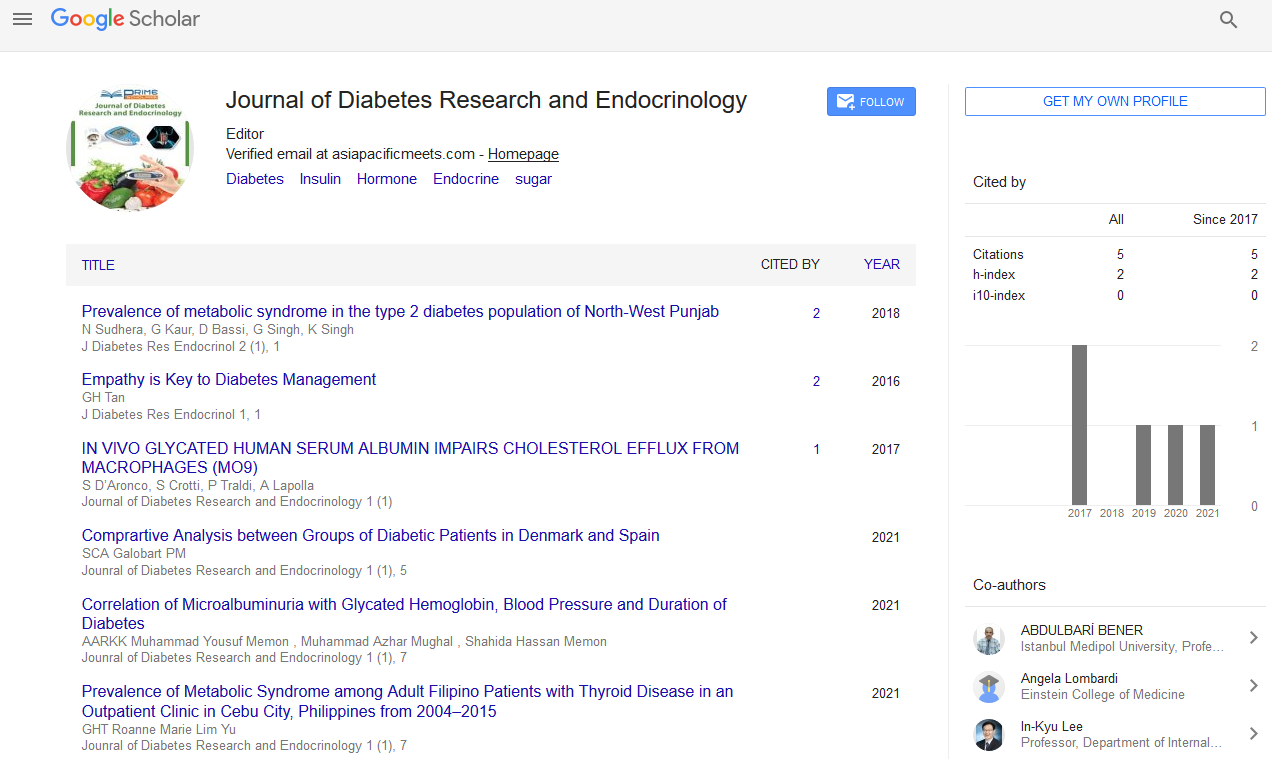Perspective - (2022) Volume 6, Issue 6
The Pathophysiology of Diabetes Mellitus is Complex and Incompletely Understood
Valeria Velluti*
Department of Endocrinology, Royal University, Bhutan
*Correspondence:
Valeria Velluti,
Department of Endocrinology, Royal University,
Bhutan,
Email:
Received: 01-Nov-2022, Manuscript No. IPJDRE-22-15034;
Editor assigned: 03-Nov-2022, Pre QC No. IPJDRE-22-15034(PQ);
Reviewed: 17-Nov-2022, QC No. IPJDRE-22-15034;
Revised: 22-Nov-2022, Manuscript No. IPJDRE-22-15034(R);
Published:
29-Nov-2022, DOI: 10.36648/IPJDRE.6.6.33
INTRODUCTION
Gestational diabetes means the diabetes which occurs during
pregnancy. It turned out to be an abnormal metabolic state associated
with systemic damage to the vascular bed. Cumulative
evidence also indicates that the endocrine system is intact in
patients with diabetes mellitus. It is not clear whether the observed
endocrine changes represent a primary defect or reflect
the effects of impaired insulin action and impaired carbohydrate
and lipid metabolism on the hormonal milieu. Hypothalamus,
pituitary, adrenal, thyroid, parathyroid, vitamin D system,
the function of the entire endocrine system, including the
function of hormones from the gonads, and endocrine function
of adipose tissue are impaired. Good metabolic control and
insulin therapy can reverse some of these abnormalities. The
extent to which these changes in the endocrine system contribute
to the vascular pathology observed in diabetic patients and
whether some of the abnormalities observed in the endocrine
system reflect the cellular defects underlying the diabetic syndrome
remain to be investigated as not yet been elucidated.
Description
In the current overwhelming era of polypharmacy, the dynamic
and delicate balance of the endocrine system can easily be
disturbed by disruptive pharmaceutical agents such as drugs.
Drugs can cause endocrine abnormalities through a variety
of mechanisms, including direct alterations in hormone production,
altered regulation of feedback axes, hormone transport,
hormone binding and signaling, and similar alterations in
counter-regulatory hormonal systems. Additionally, drugs can
interfere with hormone testing, leading to false test results
that prevent clinicians from making a correct diagnosis. The
purpose of this review is to cover the topical problem drug-induced endocrinopathy presented at the 2018 single-themed
annual Combo Endo course. This challenging part of endocrinology
has been continually expanded, especially in the last
decade, by new tumor therapeutics that target new molecular
pathways in the course of malignancy. In this new context of
drug-induced endocrinopathies, clinicians must be aware that
drugs can induce endocrine abnormalities through multiple
mechanisms, mimicking different clinical scenarios. Therefore,
it is of great importance for physicians not only to detect
drug-induced hormonal and metabolic abnormalities promptly,
but also to address therapeutic issues for timely intervention.
Conclusion
Normal water balance with tight maintenance of plasma osmolarity
depends on adequate water conservation (via ADH release
and action) and additional water intake when appropriate
(triggered by thirst). CNS pathologies (including trauma) commonly
affect the hypothalamus and pituitary stalk, resulting in
impaired osmoreceptor function or decreased ADH production
or release, leading to diabetes insipidus (a life-threatening with
possible abnormal fluid and electrolyte status). Assessing the
relationship between plasma and urine osmolality and plasma
ADH levels usually leads to an accurate diagnosis. Central diabetes
insipidus is effectively treated by replacing free water
deficits and exogenous ADH analogues.
Acknowledgement
None.
Conflict of Interest
The authors declare that they have no conflict of interest.
Citation: Velluti V (2022) The Pathophysiology of Diabetes Mellitus is Complex and Incompletely Understood. J Diab Res Endocrinol. 6:33.
Copyright: © 2022 Velluti V. This is an open-access article distributed under the terms of the Creative Commons Attribution License, which permits unrestricted use, distribution, and reproduction in any medium, provided the original author and source are credited

